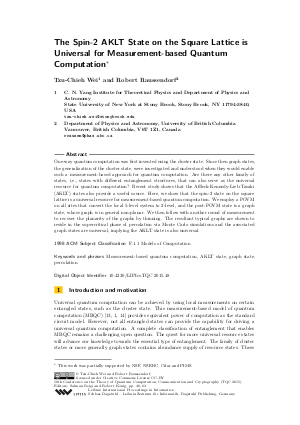The Spin-2 AKLT State on the Square Lattice is Universal for Measurement-based Quantum Computation
Authors Tzu-Chieh Wei, Robert Raussendorf
-
Part of:
Volume:
10th Conference on the Theory of Quantum Computation, Communication and Cryptography (TQC 2015)
Part of: Series: Leibniz International Proceedings in Informatics (LIPIcs)
Part of: Conference: Conference on the Theory of Quantum Computation, Communication and Cryptography (TQC) - License:
 Creative Commons Attribution 3.0 Unported license
Creative Commons Attribution 3.0 Unported license
- Publication Date: 2015-11-04
File

PDF
LIPIcs.TQC.2015.48.pdf
- Filesize: 0.73 MB
- 16 pages
Document Identifiers
Subject Classification
Keywords
- Measurement-based quantum computation
- AKLT state
- graph state
- percolation
Metrics
- Access Statistics
-
Total Accesses (updated on a weekly basis)
0Document
0Metadata
Abstract
One-way quantum computation was first invented using the cluster state. Since then graph states, the generalization of the cluster state, were investigated and understood when they would enable such a measurement-based approach for quantum computation. Are there any other family of states, i.e., states with different entanglement structures, that can also serve as the universal resource for quantum computation? Recent study shows that the Affleck-Kennedy-Lieb-Tasaki (AKLT) states also provide a useful source. Here, we show that the spin-2 state on the square lattice is a universal resource for measurement-based quantum computation. We employ a POVM on all sites that convert the local 5-level system to 2-level, and the post-POVM state is a graph state, whose graph is in general non-planar. We then follow with another round of measurement to recover the planarity of the graphs by thinning. The resultant typical graphs are shown to reside in the supercritical phase of percolation via Monte Carlo simulations and the associated graph states are universal, implying the AKLT state is also universal.
Cite As Get BibTex
Tzu-Chieh Wei and Robert Raussendorf. The Spin-2 AKLT State on the Square Lattice is Universal for Measurement-based Quantum Computation. In 10th Conference on the Theory of Quantum Computation, Communication and Cryptography (TQC 2015). Leibniz International Proceedings in Informatics (LIPIcs), Volume 44, pp. 48-63, Schloss Dagstuhl – Leibniz-Zentrum für Informatik (2015)
https://doi.org/10.4230/LIPIcs.TQC.2015.48
BibTex
@InProceedings{wei_et_al:LIPIcs.TQC.2015.48,
author = {Wei, Tzu-Chieh and Raussendorf, Robert},
title = {{The Spin-2 AKLT State on the Square Lattice is Universal for Measurement-based Quantum Computation}},
booktitle = {10th Conference on the Theory of Quantum Computation, Communication and Cryptography (TQC 2015)},
pages = {48--63},
series = {Leibniz International Proceedings in Informatics (LIPIcs)},
ISBN = {978-3-939897-96-5},
ISSN = {1868-8969},
year = {2015},
volume = {44},
editor = {Beigi, Salman and K\"{o}nig, Robert},
publisher = {Schloss Dagstuhl -- Leibniz-Zentrum f{\"u}r Informatik},
address = {Dagstuhl, Germany},
URL = {https://drops.dagstuhl.de/entities/document/10.4230/LIPIcs.TQC.2015.48},
URN = {urn:nbn:de:0030-drops-55484},
doi = {10.4230/LIPIcs.TQC.2015.48},
annote = {Keywords: Measurement-based quantum computation, AKLT state, graph state, percolation}
}
